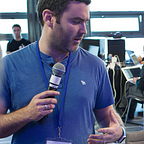Thoughts from the 2022 ARVR Innovate Conference
Optimistic but Pragmatic
I recently attended my first in-person conference since before the pandemic — ARVR Innovate 2022 in Dublin, Ireland — and it was wonderful to be actually back in a room, with other people! Hosted in the RDS, which is a large spacious venue, it never felt crowded or uncomfortable and had the obligatory hand sanitisers stations dotted around.
ARVR Innovate is a conference that is more focused on the business side of augmented & virtual reality, which is important as a lot of new or emerging technology can get caught up in hype and could do with a dose of business reality. A few years ago, this same conference was full of talks promising the incredible value of AR & VR, but in recent years there has been a more realistic and pragmatic set of views, as folks realise that both technologies are still very much ‘emerging’ and in search of truly valuable use-cases.
Some of my thoughts after attending the day:
The MetaVerse is very much in its early stages
The MetaVerse is very much hyped currently, largely driven by large investments by tech companies like Meta & Microsoft, but also (in my opinion) by a lot of folks trying to associate crypto-technology with the MetaVerse — selling virtual land via NFTs, talking about how the MetaVerse will be web3 etc, whereas the truth is the MetaVerse is very much, at worst, just an idea, or at best, a collection of unassociated prototypes.
James Watson of the Glimpse Group gave a great talk on the MetaVerse where he compared it to a set of unconnected planets, which I thought a good analogy —there’s individual ‘planets’ or applications,
some with great content, but they’re not connected or related in any meaningful way. There is no “one” MetaVerse — rather multiple early versions of what it may finally end up as.
Immersive Tech is like Dog Years
One great quote I heard from a panel at the event was “Immersive tech is like dog years” — one year equals about 7 years of advancements! That’s a nice way of explaining about how much change this domain is constantly undergoing. Currently the Oculus Quest 2 is state of the art in VR headsets, but that probably won’t last long — with Meta themselves working on ‘Project Cambria’ AKA Oculus Quest 3, along with other tech companies also working on devices.
At the conference I tried a Pico Neo 3 — a competitor device whose parent company also owns TikTok, and also a couple of early-stage devices, thanks to the Ballyfermot College of Further Education stand, none of which were close to being ready for consumers or enterprise, but did show what’s being explored.
A Virtual Solution doesn’t always need to be actual VR
There was a fantastic example of using technology for your customers in a way that actually helps them, as oppose to be being mainly obsessed with the technology itself. Chupi Sweetman of Chupi Jewellery wanted to create a virtual experience for their customers during the pandemic and first explored creating 3D modelled virtual jewels and rings — only to realise that they would never look the same as actual diamonds etc.
So they went for a different approach where customers use a web-app to take a photo of their hand — onto which they can then place images of rings, with various options.
Simple and easy to use, it drove much greater engagement than they had expected.
VR is a great platform for the arts
A great panel at the conference, moderated by Camille Donegan, was about the use of VR in the arts — art, music, theatre etc. One panellist spoke of organising an Opera experience in VR during Covid, and being surprised to see many other similar VR experiences. The pandemic seems to have driven creativity in VR, as theatre companies, artists and others sought out new ways to connect with audiences and attempt to generate new or replacement revenue.
Almost no mention of NFTs
As I discussed above, there’s a lot of NFT / crypto / web3 hype associated with the MetaVerse and VR, but interestingly there was almost no mention of it at the conference. Most speakers talked about real use-cases, how to try to find value using immersive technology, increasing revenue, improving user-engagement, making remote working more enjoyable and efficient, or the current shortcomings and challenges in the domain. Nobody was extolling the virtues of coin-based virtual real estate, or how web3 will change the world!
In Summary
I enjoyed the conference, not only for the physical-attendance aspect but also the mixture of optimistic and pragmatic content. Virtual Reality & Augmented Reality do hold a lot of potential value, but finding the right use-cases or opportunities are key, with also the important awareness that the technologies are constantly changing and not ready yet for mass adoption.
If you’ve any thoughts or comments let me know below, you can find me at Twitter and LinkedIn. My company, Liberty IT is also hiring! More details here!
